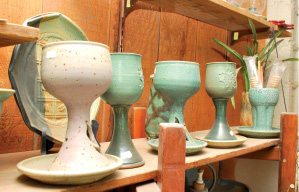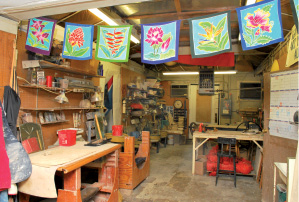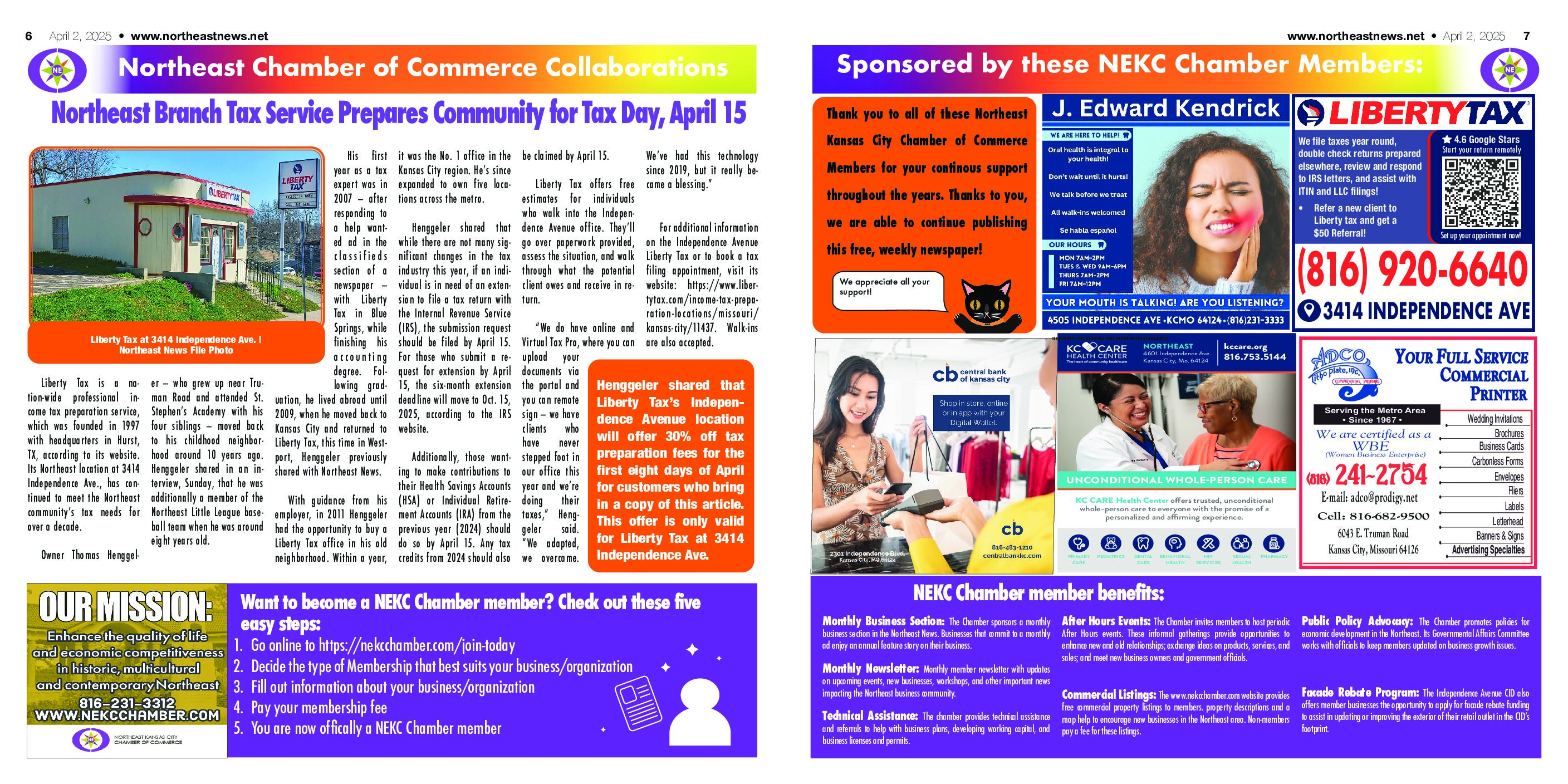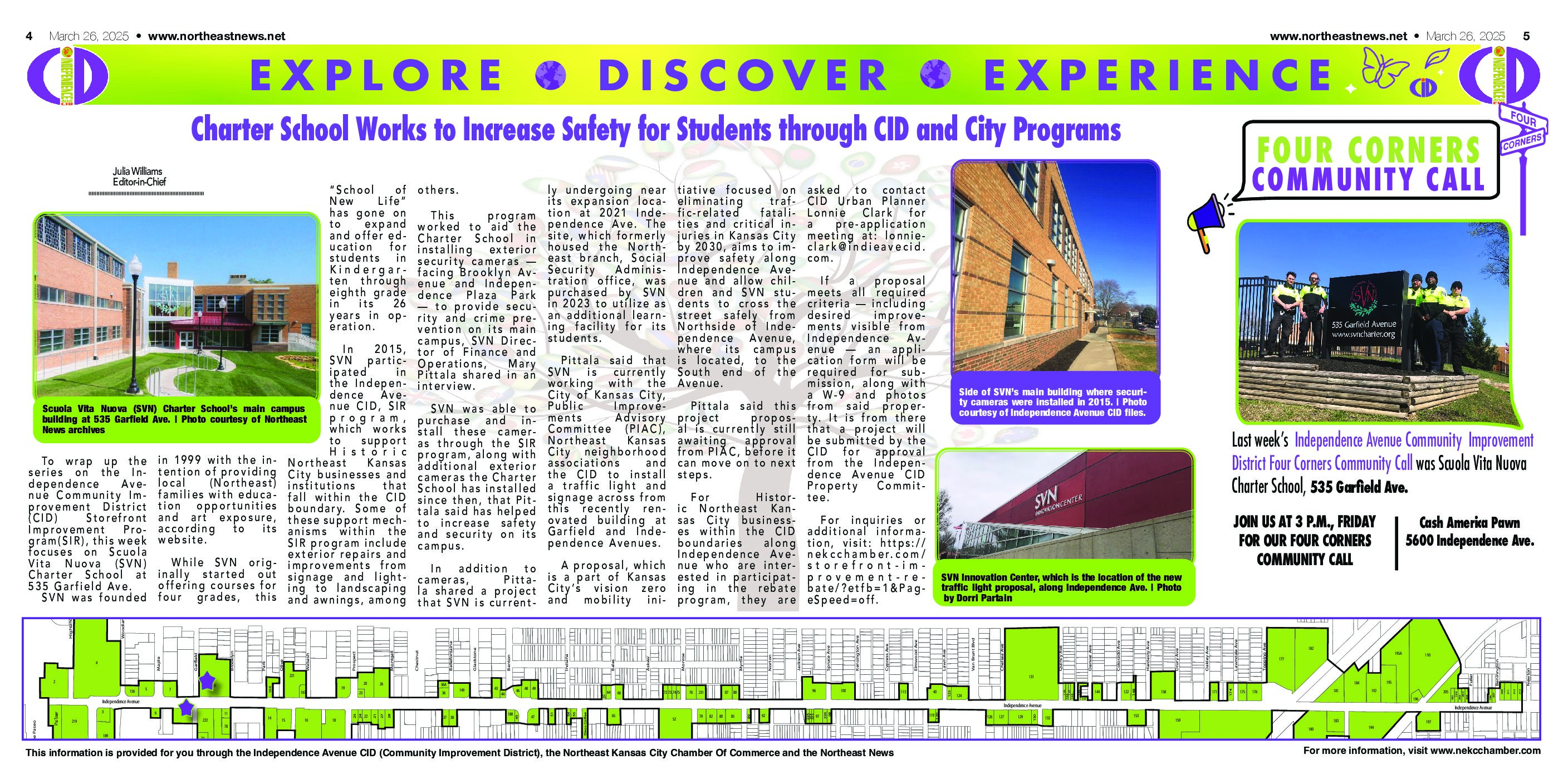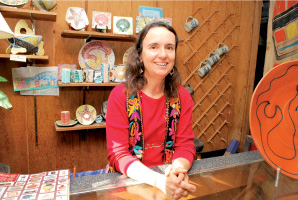
By LESLIE COLLINS
Northeast News
January 16, 2013
For the sixth time, Historic Northeast artist Rebecca Koop has been featured in the “American Art Collector,” an annual compilation of juried work.
“I think it just validates what you do,” Koop said of being published. “It’s another avenue for getting the word out about your work.”
For this year’s entry, Koop submitted a clay form inspired by a traditional watering can. To add interest, she manipulated the shape, making it oval instead of round and added strategic bulges and a green speckled glaze.
“I don’t just make a simple pot,” she said of her style. “I like to alter or modify the form. I’ll dent it, I’ll flute it; I try to add a little added value to the vessel.”
Koop grew up in Kansas City and cultivated an artistic edge from an early age.
“I entertained myself by making things,” she said.
She molded Play-Doh into masterpieces, sketched, and constructed toys for her siblings.
She’d use cardboard boxes to build dollhouses for her two sisters and crafted a barn out of construction paper for her sister’s plastic toy horses.
At the age of 10, she dreamed of becoming a potter.
Her family’s annual trip to the Plaza Art Fair inspired her as she studied the colorful pottery and watched the potters sell their goods with ease.
“They were the ones who were selling things; they were changing money,” she said. “(I thought) okay, this is a no brainer.
“I really count my blessings that I had parents who actually supported the art career idea.”
The artistic bug was common in her family. Koop, along with her siblings, learned to play a variety of musical instruments. Her grandfather had a knack for calligraphy and her mother, grandmother and great-grandmother were talented seamstresses. Working with a tight budget, her grandmother would use newspapers to create her own patterns based on fashion magazine trends and sew them for her children.
“My mom said they were the best dressed girls in high school in Calico Rock, Ark.,” Koop said.
Koop graduated from the Kansas City Art Institute with a degree in ceramics in 1979.
“My very first pottery studio was in a basement in a house on Windsor in 1980,” she said.
Koop rented the basement and a back door led to her studio, which is how she decided upon the name, “Back Door Pottery.” Koop has since left her basement dwelling and now operates Back Door Pottery on St. John Avenue. A painted stop sign graces the front of her building, but reads POTS instead of STOP. Next door, she runs St. John Community Gardens, which features a variety of beds grown by local individuals as well as quirky outdoor sculptures Koop designed herself. One of those sculptures is a metal scarecrow couple that resembles the American Gothic painting.
“I’ve been sidetracked by a lot of different things,” she said, adding that she also dabbles in fiber, weaving, paper making and other artsy activities.
Operating a brick and mortar storefront for pottery is uncommon in Kansas City, she said.
“That’s what’s kind of rare and that’s what’s special about this place in Northeast because you’re not going to find (many) storefront pottery studios,” Koop said.
Inside her shop, you’ll find orange koi swimming in an old fashioned clawfoot cast iron bathtub and of course, pottery. Her staples include mugs, toothbrush holders, soap dishes, tea pots and vases. She also likes creating matching dinnerware sets. In the back is her workspace filled with molds, glazes, potter’s wheels and a hodgepodge of other items. One saying on the wall reads, “Art without imagination is craftsmanship. Art without craftsmanship is modern art.”
Before Koop accepted the position of executive director of the Northeast Kansas City Chamber of Commerce, she taught ceramics courses at William Jewell College for nearly 20 years. Koop still offers private lessons in her pottery shop.
“It’s that inquisitive mind and that discovery,” Koop said of what she enjoys about teaching. “It’s seeing a spark in somebody because us instructors need to be re-sparked every now and then. I have to be reminded of the live thing in your hands you’re creating. It’s not just another freaking bowl.
“It’s very rewarding to see people discover themselves and discover the skills they actually have. One of the first things they’ll say is, ‘I’m not really an artist, or I don’t have talent.’ There’s talent in there, you just have to figure out how to find it.”
It’s okay to make mistakes, she said, and added that the sign of an excellent craftsman is by how well he can hide his mistakes.
While Koop’s trademark is how she manipulates the shape of her pottery, she also takes pride in her glazes. Depending on how a glaze is mixed and fired, it can look different each time, she said.
“People are dazzled by color. They really are,” she said.
For her customers, she incorporates an array of colors, but Koop is partial to black.
“I love black and white photography, but not everybody likes black,” she said. “I think black is very elegant, but black has other connotations – it’s depressing, it’s for a funeral. But, I also think of it as the little black dress. Everybody’s got to have one.”
